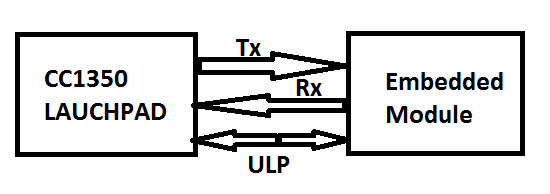Other Parts Discussed in Thread: CC1350
Tool/software: TI-RTOS
Hello,
I am working on project in which CC1350 launchpad needs to communicate with a embedded system module through UART which keeps in sleep mode. For achieving communication between two following conditions are there
1. To send data from CC1350 to Embedded module, CC1350 should make ULP pin high for few seconds
2. To send data from Embedded module to CC1350, Embedded module should make ULP pin high for few seconds
To do so ULP pin should act as as Input as well as Output. How could I make one pin on CC1350 to act as input and output to work as an ULP pin?


